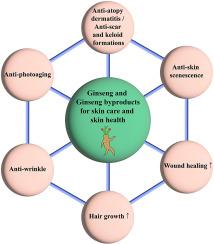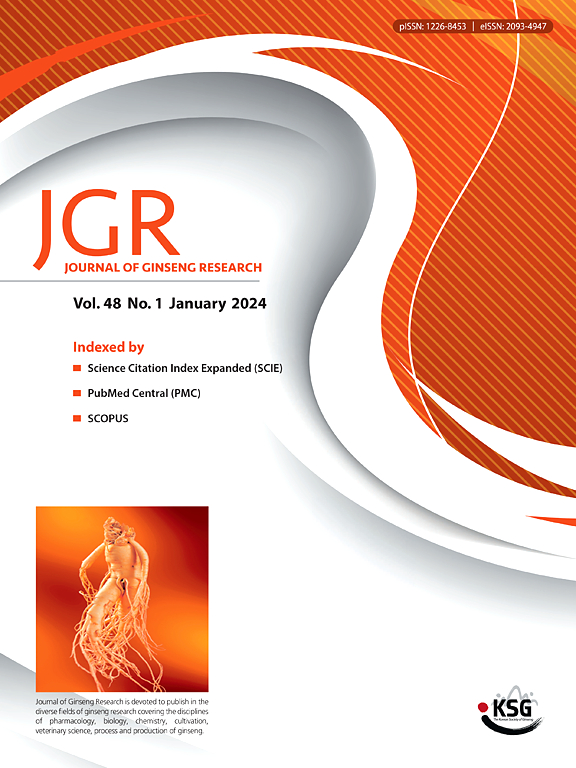用于护肤和皮肤健康的人参和人参副产品
IF 6.8
2区 医学
Q1 CHEMISTRY, MEDICINAL
引用次数: 0
摘要
人参是一种传统草药,用于预防和/或治疗各种疾病的历史悠久。人参在世界各地被用作保持人体健康的功能性食品。此外,人参还被用作化妆品的原料,用途广泛,从调理皮肤到抗衰老。一些化妆品含有韩国和其他国家的人参提取物,因为人们认为人参也能对人体皮肤产生有益的影响。然而,目前还不清楚哪种人参成分可能是直接促进皮肤健康和/或防止皮肤老化的主要活性化合物。了解人参成分对皮肤和皮肤健康产生影响的机制也很重要。本综述介绍了最近涉及人参提取物、人参成分和人参副产品在护肤和皮肤健康方面的体外和体内研究,并讨论了人参皂苷、人参皂苷和人参副产品可能成为护肤和皮肤健康应用(从抗衰老到治疗特应性皮炎、增生性疤痕和瘢痕疙瘩等皮肤疾病)的新型候选物质的新证据。本综述讨论了人参成分和副产品对皮肤健康产生有益影响的机制。此外,这篇综述还展示了人参成分,如新发现的人参成分人参皂苷,在作为化妆品的辅助成分使用时,如何促进皮肤健康和皮肤疾病,并进一步提出了一种含有人参皂苷和人参皂苷的化妆品新组合。本文章由计算机程序翻译,如有差异,请以英文原文为准。

Ginseng and ginseng byproducts for skincare and skin health
Ginseng is a traditional herbal medicine with a long history of use for the prevention and/or treatment of various diseases. Ginseng is used worldwide as a functional food to maintain human health. In addition, ginseng has been used as a raw ingredient in cosmetics with various applications, ranging from skin toning to anti-aging. Some cosmetic products contain ginseng extracts from Korea and other countries, as it is thought that ginseng can also exert beneficial effects on human skin. However, it remains unclear which ginseng component(s) could be the main active compound that directly contributes to skin health and/or prevents skin aging. It is also important to understand the mechanisms by which the ginseng component(s) exert their effects on the skin and skin health. This review describes recent in vitro and in vivo studies involving ginseng extracts, ginseng ingredients, and ginseng byproducts for skincare and skin health and discusses emerging evidence that ginsenosides, gintonin, and ginseng byproducts could be novel candidates for skincare and skin health applications ranging from anti-aging to the treatment of skin diseases such as atopic dermatitis and hypertrophic scars and keloids. The mechanisms underlying the beneficial effects of ginseng components and byproducts on skin health are discussed. In addition, this review shows how ginseng components, such as gintonin, a newly identified ginseng component, might contribute to skin health and skin disease when used as a supplementary ingredient in cosmetics and further proposes a novel combination in cosmetic products containing both ginsenosides and gintonin.
求助全文
通过发布文献求助,成功后即可免费获取论文全文。
去求助
来源期刊

Journal of Ginseng Research
CHEMISTRY, MEDICINAL-INTEGRATIVE & COMPLEMENTARY MEDICINE
CiteScore
11.40
自引率
9.50%
发文量
111
审稿时长
6-12 weeks
期刊介绍:
Journal of Ginseng Research (JGR) is an official, open access journal of the Korean Society of Ginseng and is the only international journal publishing scholarly reports on ginseng research in the world. The journal is a bimonthly peer-reviewed publication featuring high-quality studies related to basic, pre-clinical, and clinical researches on ginseng to reflect recent progresses in ginseng research.
JGR publishes papers, either experimental or theoretical, that advance our understanding of ginseng science, including plant sciences, biology, chemistry, pharmacology, toxicology, pharmacokinetics, veterinary medicine, biochemistry, manufacture, and clinical study of ginseng since 1976. It also includes the new paradigm of integrative research, covering alternative medicinal approaches. Article types considered for publication include review articles, original research articles, and brief reports.
JGR helps researchers to understand mechanisms for traditional efficacy of ginseng and to put their clinical evidence together. It provides balanced information on basic science and clinical applications to researchers, manufacturers, practitioners, teachers, scholars, and medical doctors.
 求助内容:
求助内容: 应助结果提醒方式:
应助结果提醒方式:


